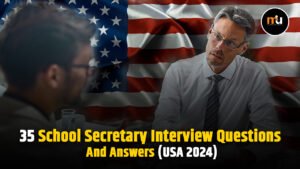The preparation an interview for finance directors interview, you must research the company, gaining a grasp of the accounting concepts, and practicing answers to the questions you might be asked.
This article outlines the most frequently asked finance director interview questions that cover the management abilities, technical skills as well as industry knowledge and compatibility.
Examining these important questions as well as the model responses can help candidates demonstrate their abilities and willingness to supervise the organization’s financial operations.
26 Questions for Interviews with Finance Directors and Answers
1. Why are You Attracted to becoming a Finance Director?
Example Answer: I’m interested in becoming an executive director of finance because I love leading teams and providing financial advice to assist organizations achieve their objectives.
My experience in analysis and financial planning qualifies me to be a competent analyst.
2. What are the most crucial skills for a successful Finance Director?
Example Answer: Key competencies include leadership, financial acumen strategy, critical thinking, communication skills and the ability to transform complex financial data into useful information.
A finance director should also keep up-to-date with accounting laws and trends.
3. How Do You Assess The Finance Health Of A Company?
Example Answer: I’d examine the financial statements of the company by looking at the metrics such as growth in revenue profits margins as well as cash flow, debt levels and the working capital.
Examining these numbers with time and industry benchmarks can provide valuable insights. I’d also be looking for trends in operations that affect the financials of the company.
4. How do you go about Reduce Costs in an Company?
Example Answer: I’d start with analyzing the expenses according to the category and function. This can help you identify for reducing costs or improving efficiency.
There are several ways to consolidate suppliers and negotiating lower rates, maximizing the amount of staff, eliminating unnecessary expenditure and reducing energy consumption and using technology.
It is crucial to evaluate the potential impact on revenue, productivity as well as customer satisfaction. prior to making any major changes.
5. What steps would you take to improve cash flow?
Example Answer: Increasing cash flow requires an in-depth analysis of the factors that drive it, such as collection efficiency, payment terms as well as payments management, inventory levels and the processing of invoices.
Once I have identified the weaknesses I can then introduce solutions, such as giving discounts for customers who pay early payment, decreasing stock on hand as well as negotiating better terms of payment with suppliers and streamlining collection.
However, it’s essential to ensure that the short-term cash flow solutions won’t adversely affect the long-term performance of your business.
6. How Do You Go About Deciding What Capital Projects To Invest In?
Example Answer: I’d start by obtaining data on every project in consideration, including the upfront cost, expected ROI, payback times and operational efficiency improvement risk, aligning with the strategic objectives.
Then I’d score each project using these criteria and then weigh them according to importance, creating weighted scores and then evaluate them. This allows me to objectively assess and prioritize the projects that will yield the highest financial return.
7. What is your experience with Financial Reporting and Planning?
Example Answer: In the last 10 years, I’ve had an extensive background in the creation of budgets, financial statements, and budgets for a variety of companies.
In my current employer, I am in charge of the analysis and planning of financials task, which involves consolidation of reporting and forecasting, variance analysis annually budgeting and other important strategic initiatives planning.
I work closely with department heads to better understand the driving forces and ensure that our plans are in line with the general business objectives.
8. What does a Director-level Role in Finance Leadership entail compared to lower-level Finance roles?
Example Answer: as a Finance Director my job requires higher-level strategic leadership, as opposed to more smaller-level positions that are more tactically focused.
The main differences are the influence of cross-functional teams and authority to make decisions with regard to a long-term financial plan and growth strategies, capital allocation and operational priorities that have significant business implications. Finance leadership requires a big-picture focus and vision.
9. How Do You Plan To Go About Implementing a New Financial System?
Example Answer: Implementing a brand new financial system requires careful planning, communications and project management. I suggest beginning by forming an inter-functional team as well as clearly defining goals and success measures.
Then, I’d plan the timeline, tasks, buffer space as well as the resources and budget necessary for a smooth execution with little disruption.
Continuous team communication and monitoring against the plan is vital. Also, there must be thorough instruction and change management in order to increase user acceptance.
10. What are your experiences In the field of preparing financial reports and managerial Recommendations for Executive Audiences?
Example Answer: I’ve produced a number of high-level financial statements and forecasts, variance analyses, forecasts and strategic suggestions for the C-suite at company XYZ.
This includes the consolidation and interpretation of the complex budget information and the communicating important drivers, trends, and opportunities for profit optimization.
I leverage my analytical skills in data analysis, coupled with expertise in business to convert data into useful and relevant insights that can be used for decisions.
11. What is it that makes a highly effective Finance Director?
Example Answer: Key qualities are strategicorientation, influential leadership, analytical skills, operationsorientation, financial acumen, project management skills, and excellent communication skills.
A good finance director is able to connect the dots between figures and opportunities and priorities for the business.
They are the ones who coordinate efforts across the company to ensure that financial strategies are in line with and assist in achieving the company’s strategic goals.
12. How Do You Assess The Effectiveness of your Accounting And Finance Team Members?
Example Answer: I establish precise goals and customized performance metrics for each position that are aligned with the overall goals of the department and then monitor progress using techniques like reviews and one-on-ones. However, I also promote open communication.
I would like my team to identify roadblocks before they occur so that I can coach and guide them through difficulties. I allow them to be autonomous, however I evaluate the quality of their work through regular audits.
I also collect feedback from partners across functional areas in order to provide balanced developmental feedback to grow.
13. What have you learned from Writing Financial Communications For The Non-Finance Audience/Senior Executives?
Example Answer: In the previous two roles as a finance director I wrote quarterly executive reports that highlighted the most important financial news, trends and risks and strategic suggestions for opportunities for growth in cash flow, cash flow optimization, and cost control initiatives.
My method is to take complex financial information and turning it into easy, visually appealing and simple-to-read communications.
I was honored for the translation of financial terminology into crucial business information and the subsequent steps that department managers could easily implement following my analysis.
14. How Do You Decide Finance Department Priorities And Allocate The Resources?
Example Answer: I employ an approach that is collaborative and based on metrics. I am in constant communication with department heads across the organization to comprehend the needs and goals. I look over the workload, capacity plans and success metrics to find the gaps and resourcing requirements.
Together with me and my colleagues, we organize tasks, match skills of talent to requirements and identify initiatives that are strategically aligned to achieve the highest ROI and impact.
If resources are constrained I will reduce tasks that aren’t priority and automate when possible. I may also look into hiring more staff or outsource.
15. What tools or processes do You Use To Forecast Financial Expenditures and Planning?
Example Answer: I utilize an array of tools and processes to assist in forecasting and planning, leveraging platforms such as Anaplan as well as Oracle Hyperion along with Excel and Access databases. We collect bottom-up estimates from every business unit and each function.
I collaborate with the operations team to examine assumptions and ensure they align with the strategic objectives. We conduct sensitivity tests to determine the risk factors.
Tools enable us to simulate various spending and growth scenarios to evaluate the potential impact on your bottom line. This allows for nimble and efficient planning based on data.
16. How Can You Reduce Significant risks to an organization’s financial Health?
Example Answer: You should begin by conducting a risk assessment of the external environment, internal operations competitors, and the regulatory environment to determine major risks across various areas, such as credit, cash flow, investment, debt obligations etc.
In the case of risky situations I assess the potential impact severity and probabilities. For risks with the highest priority I’d develop risk mitigation plans that include security measures and preventative controls. ensure insurance coverage is as secure as possible and create contingency plans defining the policy and processes to be implemented to ensure financial stability if significant risk-related events were to happen.
17. What experience do you have in Fundraising and securing financing for an Organisation?
Example Answer: the director of finance for a variety of rapidly growing companies I have vast experience in raising capital via equity financing partnerships as well as agreements for debt.
For instance in Xentix Corporation I worked closely with investment banks to secure a $20 million in Series B financing to fund the rapid expansion plans. I also managed negotiations and secured a $10 million credit line for business lines to meet seasonal requirements for working capital and smooth cash flow.
18. What’s your most significant career achievement that demonstrates your readiness to become a Finance Director?
Example Answer: As the Finance Head in the Acme Media’s Northeast Region, I conceived and implemented an economic turnaround plan in the midst of an industry slump that allowed us to shift into growth mode while competitors were facing reductions in staff and revenue.
With careful cost control coupled with a strategic marketing investment aimed at new markets, I was able to increase revenue by 20% and an increase of 40% in profit margin.
The executive praised me and gave me confirmation that my leadership abilities are ready for the highest finance position.
19. Share your communication style and how you build relationships with Cross-Functional Partners.
Example Answer: I use active, open communication that keeps my partners updated instead of simply relaying reports on a regular basis.
By conducting regular check-ins I am able to better understand their needs, goals and how the finance team can offer crucial guidance and assistance. My goal is to act as an advisory role that guides important decisions, not just doing numbers in isolation.
My clients appreciate my ability to convert complex financial data into clear, yet insightful insight. The two-way trust and teamwork ensures the same satisfaction.
20. How Can You Make Sure You’re Finance Team Incorporates Proper Internal Controls and adheres to Accounting Policies and Government Regulations?
Example Answer: Oversight begins by educating yourself continuously. I provide regular training to my employees on the most current laws and company accounting guidelines along with a clear and concise documents.
Our self-audits are conducted periodically to verify that all transactions and reports are in line with the standards for protocols and controls as well as identifying any gaps in the process to be addressed.
Finance personnel have an established escalation process for examining unusual requests. As an extra step we rely on external audits to ensure the highest level of governance from an independent view.
21. What applications do you have experience With for financial planning, reporting and Data Analysis?
Example Answer: I have vast expertise with the top applications like Oracle, SAP, Adaptive Insights, Anaplan, Hyperion, IBM Cognos, QuickBooks and Excel for financial planning, consolidations, reports and analytics.
I stay up to date with the most recent fintech solutions and have helped a variety of companies to evaluate and implement the latest cloud-based platforms to improve the agility of finance functions, insight and efficiency.
22. How Do You Assess the ROI of a potential investment, expansion project or A New product line?
Example Answer: I’d work closely with the ops teams to create multi-year profit projections that incorporate estimates of revenue growth along with ongoing and initial costs required for investments, the impact of cost for scaling operations, and the benchmarking of profit margin goals.
Examining different scenarios with various investment levels, I can see that incremental spending produces negative returns.
I analyze the resulting metrics, such as the IRR as well as projected NPV against the estimated weighted mean cost of capital in order to make sensible recommendations for directing funds to high-confidence growth driving factors.
23. Please describe your experience in leading corporate initiatives that go beyond Finance roles. What transferable finance skills helped you prepare for these new duties?
Example Answer: In my role as the VP of Finance for Acme Retail, I led large-scale initiatives across the enterprise around the digital revolution and improving customer experiences that took my role to levels that went beyond financial responsibilities.
My experience as a controller gives me crucial insight into operational bottlenecks, waste wasted, and technology limitations that hold back growth and innovation, as well as opportunities for growth related to the needs of customers.
Understanding the metrics of customer lifetime value assists me in implementing high-ROI initiatives that prioritize pain points and experiences that boost retention and increase wallet share.
24. What is the best way to implement a Business Cost Management Culture across decentralized business units?
Example Answer: Getting widespread engagement with cost involves the support of leaders, cross-functional collaboration and placing accountable owners in the driver’s seat. I implement zero-based budgeting cycles that allow managers to justify all expenditures in a case-by-case manner instead of simple percentage reductions.
I have tools that illustrate the tradeoffs between savings targeted and. the impact on revenue and customers instead of imposing blanket reductions.
Managers measure their performance against top performers, and are rewarded for the savings rates that are achieved. I also highlight cost savings to celebrate successes.
25. What sources can you go to when you need to Provide significant technology investment recommendations?
Example Answer: I use multiple channels to conduct research on important technology investments. I rely on peer networking groups as well as industry conferences to gain insight into the best practices in the real world, not just marketing hype and promises from vendors.
I use third-party advisory firms such as Gartner to get objective evaluations of the maturity of a solution and comparisons between vendors. I seek out demos and tests of the options I have selected, as well as small-scale demonstrations for the most efficient platforms.
I am in contact with early adopters who are willing to share sources to help me understand the limitations and lessons learned to ensure more efficient deployments.
26. What are you hoping to Have Your Career Go in the next 5 years?
Example Answer: Over the next five years I plan to assume the role of executive leader as CFO of an international public company that manages an extensive finance department.
I’d like to apply my strategic vision of the big picture together with my operational financial knowledge to drive solid and sustainable shareholder growth and maintain the highest standards of ethical and responsible business conduct.
The Finance Director Interviews: Important Tips.
Do your research thoroughly on the company – Examine the company’s financial statements, its industries, competitors and the company’s overall goals and strategies. This can help you comprehend the importance of your role and also provide a clear understanding of how you can help.
Improve your technical abilities Finance directors need to be extremely numerate and analytical. Revise Excel modeling budgeting, forecasting and variance analysis, as well as other finance capabilities you’ll require to demonstrate.
Practice answers to the most frequently asked inquiries – Expect questions regarding leadership as well as strategic thinking and control of cash flow reports, and team development. Practice summarizing relevant examples.
Create questions you can ask Engaging with your questions in a thoughtful manner shows commitment and an interest in issues that you could be tackling as director. Ask questions about the challenges, success measures, organizational culture, management style, and more.
Find the perfect balance between the technical and interpersonal aspects Finance managers require the ability to understand financials as well as the ability to influence and coordinate teams to implement a strategy. Make sure to emphasize both of these in your examples.
Convey strategic orientation. as a director, your job responsibilities extend beyond just number crunching into decision support and strategy. Discuss your capacity to connect operational aspects to larger objectives.
Discuss how you manage control while working with stakeholders. You manage the finance department, but you must not hinder commercial success by allowing flexibility and teamwork.
Make sure you have references in place – provide pertinent contacts, such as previous finance executives and cross-functional partners who support your style of leadership.
Pay attention to the body language and tone of your voice. Be confident and stay cool and calm in stressful situations. This can create positive impressions about the executive’s character.
Final Thoughts
Being able to successfully interview for the role of finance director requires a careful approach and logical examples that demonstrate your leadership skills along with financial acumen and an ability to create the business impact of your partner.
We hope that these 26 typical questions and examples of answers to provide a guideline for success regardless of the obstacles that may arise during your interview.
The responses must be created with care, using relevant industry examples, not simply copied from a third-party source.
If you are diligent and have the ability to articulate your skills, you’ll be well on the way to obtaining the director of finance position you’ve always dreamed of.






